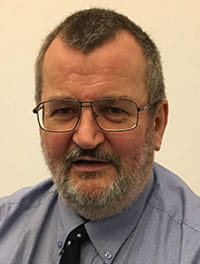Surgical Care Practitioner Case Study
Read on to find out more about life as a Surgical Care Practitioner from the perspective of Adrian Jones, one of the first of his kind.

A brief summary of local Surgical Care Team roles
I work alongside consultant and trainee surgeons as their surgical assistant, ensuring that a clear view of the operation site is maintained. Surgical assistance also involves manipulating joints and limbs to ensure safe surgery. At my Trust there are six Surgical Care Practitioners (SCPs) who support 30 consultant-led teams in theatres. The role enables experienced perioperative practitioners to continue to practice in a challenging critical care clinical environment. I was one of the first Orthopaedic Surgical Care Practitioners in England and now I supervise and teach basic surgical skills to junior doctors and SCP trainees.
How have surgical care team roles supported patient care, the service, and the team?
Under the direction of a Consultant surgeon and in conjunction with local guidelines and where applicable taking additional qualifications, SCPs may participate in Clinics, seeing specific pre-operative patients and listing them for surgical procedures following additional training appropriate to local guidelines and requirements. We are involved with the consent process following guidelines from the GMC and local trust or healthcare provider. Preparing patients for surgery reduces the demand on surgeons. We facilitate continued patient care. My colleagues undertake patient pre-assessments and post-surgery review clinics for consultants they practice with. Following the appropriate training SCPs can prescribe specialty-appropriate medication, if deemed necessary by the consultant.
Do you have any tips for how others can implement this model of care?
Having SCPs enables experienced practitioners in the theatre environment to become a clinical role model, patient advocate and local surgical agent. Remember your surgical conscience – you do not cut corners! Practice integrity when you move into leadership and become a role model. Persevere; it is hard working closely with surgeons, you need the ability to get on with a group of amazing but sometimes intense individuals.
What challenges have you faced in your role?
One of the main challenges are the long days in surgery. Sometimes even now, the role is not fully understood by senior nurse managers. Agenda for Change pay parity is required across the UK. I have been a Band 7, teaching SCP students from another geographical location who were also at a Band 7 and would then become a Band 8a on completion of training! The NHS does not recognize Specialist or Advanced Nurses well, in the same way that it does those who pursue management role progression.
